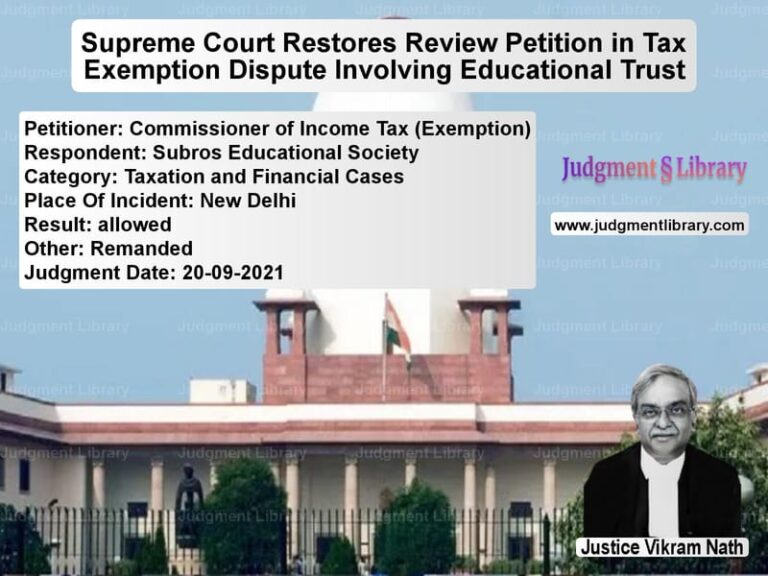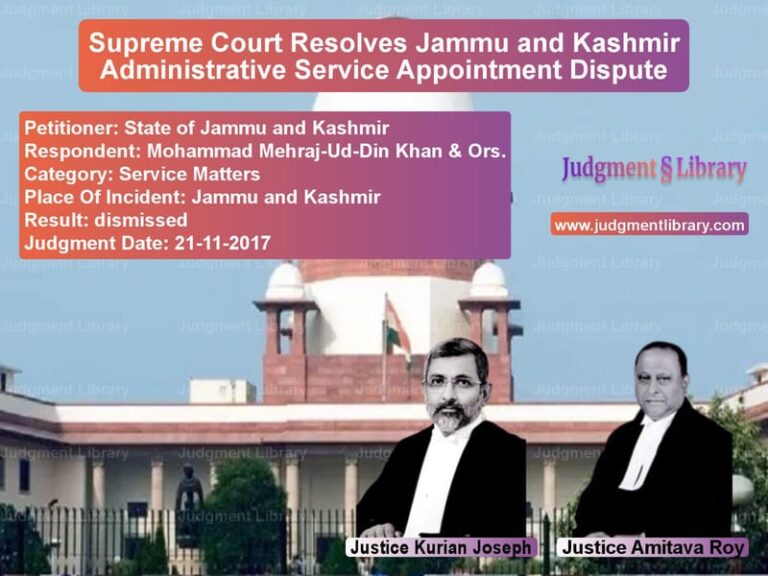Tax Assessment Challenge: Supreme Court Rules on Limitation for Appeal
The case of Assistant Commissioner (CT), LTU, Kakinada & Ors. vs. M/s. Glaxo Smith Kline Consumer Health Care Limited revolves around a challenge to a tax assessment order. The Supreme Court had to decide whether the High Court was justified in entertaining a writ petition challenging the assessment order after the statutory appeal period had lapsed.
Background of the Case
M/s. Glaxo Smith Kline Consumer Health Care Limited, a registered dealer under the Andhra Pradesh Value Added Tax Act, 2005 (2005 Act) and the Central Sales Tax Act, 1956 (1956 Act), was assessed for the financial year 2013-14 by the Assistant Commissioner of Commercial Taxes, Large Taxpayer Unit, Kakinada. The assessment order, passed on June 21, 2017, raised a demand of ₹76,73,197 on the grounds that the respondent failed to submit Form “F” for certain inter-state transactions.
The assessment order was duly served on June 22, 2017. However, the respondent did not file an appeal within the statutory period but instead deposited 12.5% of the demand on September 12, 2017. Later, on May 8, 2018, the respondent filed an application under Rule 60 of the Andhra Pradesh Value Added Tax Rules, 2005, claiming errors in turnover calculations, which was rejected on May 11, 2018.
Following this, the respondent attempted to file an appeal before the Appellate Deputy Commissioner of Commercial Taxes, Vijayawada, on September 24, 2018, which was dismissed on October 25, 2018 for being time-barred. The respondent then filed a writ petition in the High Court challenging the assessment order.
Key Issues
- Can a writ petition be entertained when a statutory appeal is time-barred?
- Did the delay in filing an appeal justify High Court intervention?
- Was the assessment order invalid due to procedural defects?
Arguments of the Petitioner (Assistant Commissioner, LTU, Kakinada)
The petitioner argued that:
- The respondent had a statutory right to appeal within 30 days, with a maximum extension of another 30 days, which was not utilized.
- The High Court erred in entertaining the writ petition despite an available statutory remedy.
- The assessment order had attained finality after the appellate authority rejected the appeal due to delay.
- The High Court’s decision undermined the legislative intent of the tax law’s limitation provisions.
Arguments of the Respondent (M/s. Glaxo Smith Kline Consumer Health Care Limited)
The respondent contended that:
- The assessment was based on incorrect turnover calculations, leading to unjustified tax liability.
- The delay in filing the appeal was due to the negligence of an employee who failed to inform the company about the assessment order.
- Upon discovering the issue, the company promptly filed an appeal, but it was rejected for being time-barred.
- The High Court had discretion under Article 226 of the Constitution to grant relief, as the statutory remedy had become ineffective.
Supreme Court’s Judgment
The Supreme Court overturned the High Court’s decision and reinstated the assessment order, making the following observations:
1. Writ Jurisdiction Should Not Bypass Statutory Remedies
The Court emphasized that High Courts should not entertain writ petitions when statutory remedies are available:
“The High Court ought not to have entertained the writ petition as a matter of course when an effective alternative remedy was available.”
2. Limitation Period is Mandatory
The Court ruled that the statutory appeal period cannot be extended beyond the prescribed limit:
“The statutory appeal is required to be filed within 30 days, with a maximum extension of another 30 days. The appellate authority cannot condone delay beyond this period.”
3. No Procedural Violations by the Tax Authorities
The Court found that the assessment order was issued following due process and that the respondent had ample opportunity to challenge it within the statutory period:
“There is no conclusive evidence to suggest that the assessment was conducted in violation of statutory provisions or principles of natural justice.”
4. Negligence of Employee is Not a Justifiable Ground
The Court rejected the respondent’s argument that an employee’s negligence justified the delay:
“The explanation that the responsible employee failed to inform the company cannot be a valid excuse for circumventing statutory limitations.”
Impact of the Judgment
This ruling has several implications for tax law and litigation:
- It reinforces that statutory appeal periods are strict and cannot be circumvented through writ petitions.
- It ensures that tax authorities’ assessment orders attain finality if not challenged within the statutory timeframe.
- It discourages taxpayers from bypassing appellate forums through High Court interventions.
- It establishes that corporate mismanagement or employee negligence cannot justify procedural non-compliance.
Conclusion
The Supreme Court’s ruling in Assistant Commissioner (CT), LTU, Kakinada & Ors. vs. M/s. Glaxo Smith Kline Consumer Health Care Limited underscores the principle that legal remedies must be pursued within statutory time limits. The judgment upholds the integrity of tax laws and prevents undue judicial intervention where statutory remedies exist. This decision serves as a clear precedent on the non-circumvention of tax assessment procedures through belated legal challenges.
Petitioner Name: Assistant Commissioner (CT), LTU, Kakinada & Ors..Respondent Name: M/s. Glaxo Smith Kline Consumer Health Care Limited.Judgment By: Justice A.M. Khanwilkar, Justice Dinesh Maheshwari.Place Of Incident: Kakinada, Andhra Pradesh.Judgment Date: 06-05-2020.
Don’t miss out on the full details! Download the complete judgment in PDF format below and gain valuable insights instantly!
Download Judgment: Assistant Commission vs Ms. Glaxo Smith Kli Supreme Court of India Judgment Dated 06-05-2020.pdf
Direct Downlaod Judgment: Direct downlaod this Judgment
See all petitions in Income Tax Disputes
See all petitions in Tax Refund Disputes
See all petitions in Banking Regulations
See all petitions in Customs and Excise
See all petitions in GST Law
See all petitions in Judgment by A M Khanwilkar
See all petitions in Judgment by Dinesh Maheshwari
See all petitions in dismissed
See all petitions in supreme court of India judgments May 2020
See all petitions in 2020 judgments
See all posts in Taxation and Financial Cases Category
See all allowed petitions in Taxation and Financial Cases Category
See all Dismissed petitions in Taxation and Financial Cases Category
See all partially allowed petitions in Taxation and Financial Cases Category






